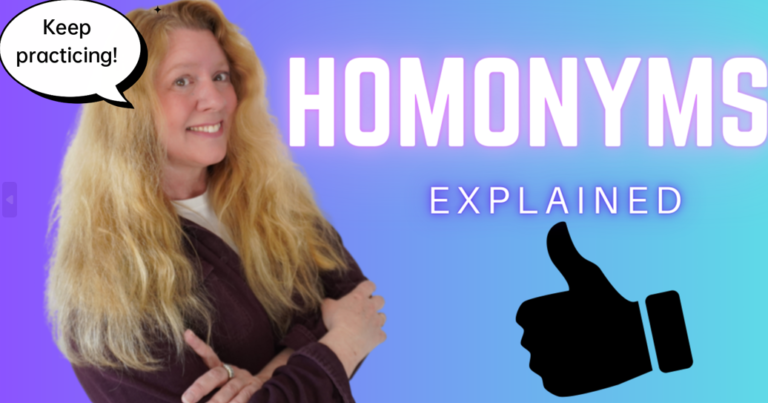Adverbs
An adverb is a word that modifies a verb, adjective, other adverbs, or adverbial phrases. There are different kinds of adverbs. These are the six different types of adverbs and how to use them in a sentence. You can also watch this video:
The six common categories of adverbs are:
- conjunctive adverbs (clauses of reason/purpose)
- adverbs of frequency
- adverbs of time
- adverbs of manner
- adverbs of degree
- adverbs of place
One thing to keep in mind is that there can be some overlap or repetition across the different categories of adverbs, because words can have more than one meaning or use depending on the context. For example, yet can be a conjunction, meaning “though,” but it can also be an adverb of time, in the sense “in the time still remaining.”
Conjunctive adverbs (clauses reason/purpose)
A conjunction is any word that connects words, phrases, clauses, or sentences. They express the relationship between ideas or parts of speech. A conjunctive adverb is an adverb that acts like a conjunction.
Conjunctive adverbs are often set off from the rest of the sentence by a comma. For example:
- We don’t have time to run to the grocery store. Besides, you already have cereal at home.
Conjunctive adverbs can also go at the end of a sentence, in which case they don’t need to be set off with a comma, as in:
- I didn’t really want a pony anyway.
List of conjunctive adverbs:
- accordingly
- additionally
- also
- anyway
- besides
- certainly
- conversely
- finally
- hence
- however
- instead
- in conclusion
- lately
- likewise
- moreover
- namely
- nevertheless
- so
- then
- yet
Adverbs of frequency
Adverbs of frequency describes at what rate over time an action or event occurs. They answer the question “How often?” Adverbs of frequency generally go just before the verb they are modifying.
- She always orders a salad.
- My brother will never forgive her.
List of adverbs of frequency:
- always
- usually
- often
- sometimes
- rarely
- never
- ever
- hardly ever
- occasionally
- seldom
- generally
- frequently
- normally
- once
- twice
Adverbs of time
Adverbs of time describe when things occur. They answer the question “When?” Adverbs of time are very flexible: they can go at the beginning of a sentence set off with a comma, right before the verb or clause they are modifying, or at the end of a sentence. It depends on the adverb and how it is being used in the sentence. For example:
- Tomorrow, the class is going to have a quiz.
- We last saw her before she went to work.
- Are you going to the mall next?
List of adverbs of time:
- tomorrow
- tonight
- yesterday
- now
- then
- today
- already
- daily
- last
- next
- previously
- after
- afterwards
- early
- late
- later
- since
- still
- just
- seldom
Adverbs of manner
Manner in ‘Adverbs of Manner’ means “a way of doing, being done, or happening.” Adverbs of manner answer the question “How?” Adverbs of manner can go before or after the verb or phrase they are modifying. For example:
- The students quickly ate their lunches.
- Our mayor spoke loudly and authoritatively.
List of adverbs of manner:
- well
- fast
- straight
- hard
- loudly
- proudly
- suspiciously
- strangely
- kindly
- easily
- rudely
- neatly
- quickly
- generously
- eagerly
- accidentally
- rapidly
- hungrily
- foolishly
- cheerfully
- really (can also be adverb of degree in sense of “very”)
Adverbs of degree
Adverbs of degree describe intensity or quantity of an action. They answer the question “How much? To what degree?” Typically, adverbs of degree go before the verb or part of speech being modified. For example:
- We were too excited to sleep.
- The toddler was extremely energetic.
List of adverbs of degree:
- lots
- somewhat
- barely
- very
- much
- most
- nearly
- too
- extremely
- enough
- so
- slightly
- especially
- just
- almost
- scarcely
- virtually
- fully
- far
- exceptionally
Adverbs of place
Adverbs of place describe location. They answer the question “Where?” Adverbs of place typically go after the verb or other part of the speech they are modifying. For example:
- I think the cat is upstairs.
- Go toward the big red house, then make a right at the light.
List of adverbs of place:
- behind
- above
- nearby
- backward(s)
- toward(s)
- outside
- inside
- around
- over
- overseas
- close
- away
- upstairs
- downstairs
- here
- there
- everywhere
- deeply
- next-door






